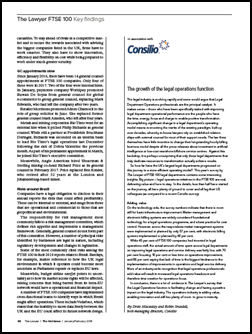Growth of the Legal Operations Function
 Drew Macaulay and Robin Snasdell discuss the rise of the legal operations function within the FTSE 100.
Drew Macaulay and Robin Snasdell discuss the rise of the legal operations function within the FTSE 100.
This article originally appeared in The Lawyer’s FTSE 100 Key Findings Report.
Preview: For the FTSE 100, 2017 proved to be another challenging year, dominated by fallout from the UK’s referendum vote in 2016 to leave the EU. This presented a number of challenges, from the decline in sterling to uncertainty around the terms of the UK’s departure. The Government’s tribulations added an element of political instability, with Prime Minister Theresa May’s Conservatives failing to win an outright majority in June’s general election. Combined, these events have generated significant financial market volatility. The FTSE 100 also faces pressure from an increasingly complex regulatory and legislative environment, ongoing legal investigations and spiralling legal costs. Big changes Legal teams are often the first port of call when responding to these challenges. However, many have seen big changes in recent years and been asked to cut costs. Despite these restraints, teams are still tasked with demonstrating both efficiency and innovation in the delivery of legal services. This report details what the likes of Coca-Cola HBC, Sky, Unilever and National Grid have done in this regard in the past 12 months. The ever-active FTSE 100 continues to provide a steady flow of work for law firms, from M&A and divestments to litigation and joint ventures. This report looks at which firms the FTSE 100 companies are instructing for these highly sought-after mandates. Securing them has never been more competitive, however, as many companies now favour much-reduced rosters. A prime example is Shell, which last year slashed its global legal panel from 250 firms to six
To read the full article, click here.